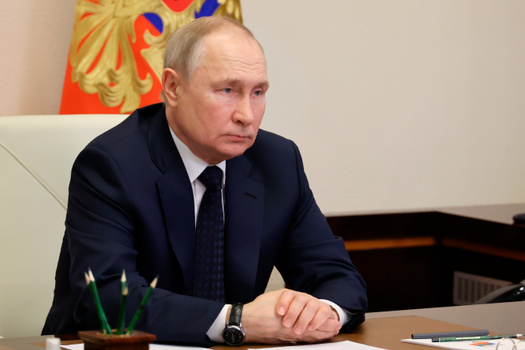
‘Spare us the hypocrisy’ Ukraine doesn’t want Putin’s Orthodox Christmas ceasefire
Мы говорим как есть не только про политику. Скачайте приложение.
Orthodox Christians in both Ukraine and Russia celebrate Christmas on its Julian date, January 7. Making yet another offensively “unifying” gesture, Patriarch Kirill, head of the Russian Orthodox Church, proposed that Russia and Ukraine cease their “infighting” for 36 hours, to let Orthodox believers attend Christmas church services. Despite Kyiv’s immediate criticism of the “truce” as nothing but a “cynical trap” and a “piece of propaganda,” Russian President Vladimir Putin supported the patriarch’s proposal, instructing the Defense Ministry to implement a temporary ceasefire on Orthodox Christmas.
Putin’s instructions to Defense Minister Sergey Shoigu call for a 36-hour ceasefire, to begin at noon on Christmas Eve, January 6, and to continue until midnight at the end of Christmas Day, January 7. The ceasefire will be in effect “along the entirety of the contact line” between the two armies.
Putin invited Kyiv to cooperate in the Christmas ceasefire. “Considering the fact that large numbers of Orthodox Christians live in the combat zone, we invite the Ukrainian side to declare a ceasefire to allow them to attend church services on Christmas Eve, as well as Christmas Day,” said the Russian president’s directive.
When declaring a ceasefire, Putin appealed to Patriarch Kirill’s earlier call for a “truce.” On January 5, the head of the Russian Orthodox Church called “all parties to infighting” to declare a temporary truce between noon on Christmas Eve and midnight at the end of Christmas Day, so that Orthodox believers could go to church.
In mid-December, the Kremlin spokesman Dmitry Peskov denied any discussions of a Christmas truce with Ukraine. “No,” he said to the journalists, “no one made any such suggestions, and there’s no such topic on the agenda.”
The Ukrainian President’s Office characterized Patriarch Kirill’s proposal as a “cynical trap” and a “piece of propaganda.” Presidential Advisor Mykhailo Podolyak accused the Russian Orthodox Church of acting as a “war propagandist” that assisted Russia’s militarization, encouraging mass murders and calling for a “genocide of the Ukrainians.” In the same tweet, he stated that the Russian church has no authority for Orthodox Christians worldwide.
Zelensky’s staff responded to Putin’s initiative by telling him to “spare the hypocrisy.” Once again, it was Podolyak who retorted, on Twitter: “First. Ukraine is not attacking another country or killing civilians, like Russia. Ukraine is only eliminating members of an invading army on its own land. Second. Russia must leave the occupied territories — only then will it be able to enjoy a ‘temporary truce.’ Spare us the hypocrisy.”
In a later statement, Olexiy Danilov, chair of the Ukrainian National Security Council, made clear that Ukraine wasn’t interested in talking to Russia about any Christmas ceasefire. “Let’s talk about it practically,” he suggested. “Whom are they offering this truce to? To themselves?” Danilov suggested that the Russian side should instead “pack their bags” and get out of Ukraine. “That priest of theirs came up with this date. We have absolutely nothing to do with it. It’s our land. We’re going to do whatever we think necessary on our own land.”
Please, read this message from Meduza’s team:
Dear readers! For eight years, Meduza has delivered reliable information about Russia and the rest of the world. Our reporting is vital for millions of people in Russia, Ukraine, and beyond. Access to trusted news sources is even more important in times of war. Help Meduza publish the news that Russia’s censors want to silence. Please, support our work.
U.S. President Joe Biden believes that Putin’s truce proposal is nothing but gasping for “oxygen.” Since Putin had no qualms about bombing “hospitals and nurseries and churches” on December 25 and the New Year, Biden feels “reluctant to respond to anything that Putin says.”
Putin’s ceasefire initiative is the first such invitation since the start of the war, and it followed the Russian president’s phone conversation with Turkish President Recep Tayyip Erdoğan, who suggested, among other things, that calls for peace and dialogue must be supported by a “unilateral ceasefire.” Putin, in turn, assured Erdoğan that he was ready for dialogue, “on the condition that Kyiv fulfills the well-known and many times restated demands” made by Russia, and does so “in light of the new geographic realities.”
It remains unclear whether the Wagner Group is subject to Putin’s ceasefire order. The Wagner formations are currently conducting an offensive on the city of Bakhmut in the Donetsk region of Ukraine, as well as its neighboring city of Soledar. Since Putin’s order is addressed to the Defense Ministry, it’s doesn’t formally apply to Evgeny Prigozhin’s private military company.
Meanwhile, the Defense Ministry has reported that it will comply with the ceasefire order. At the same time, Denis Pushilin, head of the Russian-backed government of the self-proclaimed Donetsk People’s Republic, points out that the ceasefire applies only to “initiating fire”: “It doesn’t mean that we’re not going to respond to the enemy’s provocations!” he insisted.
The truce was widely criticized around the Z-themed Russian Telegram. The notorious Rybar channel, for example, asked its one million subscribers: “Isn’t it time to stop casting pearls before the swine?” The self-styled “war correspondents” Yury Kotenok and Roman Saponkov noted that a unilateral ceasefire could not be observed, and that it would look, in Saponkov’s view, like “defeatism.” Another popular channel attributed Putin’s order to Erdoğan, whose neutral partnership is important enough to Putin to have prompted “yet another gesture of goodwill.”